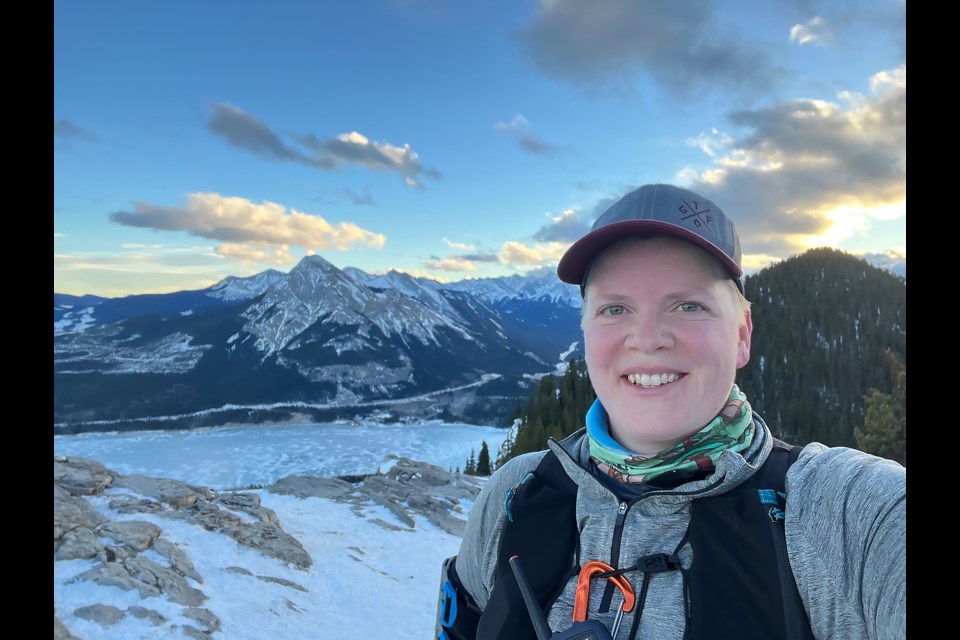BANFF – A first-of-its-kind surgery in Canada performed at Banff Mineral Springs Hospital has given Grey Leslie stability back to their knee and lifestyle.
When Leslie was told about the new surgery, they gave full trust to Dr. Laurie Hiemstra – an orthopedic surgeon and member of the Banff Sport Medicine team at the hospital.
“I didn’t even question. I was like, ‘yep, let’s do it,” said Leslie, 36.
Leslie saw it as an opportunity to get back to their outdoor lifestyle.
“I spend a lot of time doing outdoor pursuits, whether it was backcountry skiing or downhill mountain biking or road cycling or hiking, that’s just part of my identity,” said the Calgarian.
“I felt like with that surgery, it gave me an opportunity to keep as much of what I could as possible.”
The surgery uses a new implant by medical technology company Biorez – now apart of CONMED – called BioBrace, which is a synthetic ligament that is used instead of the traditional graft or replacement using a cadaver ligament.
“People have done things [for] about 30 or 40 years with synthetic ligaments, like GoreTex and other substances, but none of them really worked and they all do terrible, so this is a new one that’s out on the market,” said Hiemstra.
Dr. Hiemstra had to apply to Health Canada for a special access permit to use the BioBrace on Leslie as it’s not yet approved for use in Canada.
“I heard about it at a meeting, and I just thought of Grey right away because we were looking for a solution for them and they seemed to fit the bill,” she said.
While the implant won’t entirely fix Leslie’s knee, it’s given them back the stability needed to return to the cross country and mountain bike trails.
“Dr. Hiemstra gave me the go-ahead to go back to cross country skiing. So, it was pretty exciting for me to get a sport back for the first time,” said Leslie.
“Previously, it had always been ‘OK, you shouldn’t probably do this anymore. You shouldn’t probably do that anymore.’ And this was the first time where she was actually like, ‘yep, things are looking good, let’s see how much time we can get out of what you’ve got.’”
Leslie has been through three surgeries before the BioBrace on one knee after suffering multiple injuries and hypermobility.
“I just decided that this is part of me, but I’m not going to let it be what defines me,” said Leslie.
Leslie was even able to get back to shifting through the gears in their manual car.
“It’s my clutch leg, so that was interesting getting back to being able to drive the car,” they said.
“I think there’s going to be more use of the graft in the future. And if that’s the case, I am hopeful that those people obviously benefit from it.”
Since Leslie’s surgery, Hiemstra has been able to use the brace two more times and has been approved to study the implant on 20 more patients in the future, meaning that she won’t need to apply for a special permit every time.
“You don’t have to get that special access permit, for a single use. We actually got studying approval to do 20 of them in this specific patient population. It’s pretty exciting,” said Hiemstra.
The study looks to decrease the risk of more dislocations and damage for people who have dislocated their knee for the first time.
“We’re actually trying to change the natural history,” said Dr. Hiemstra.
“When people dislocate their kneecap for the first time, we want to decrease the risk of that coming out any more times at all.”
She will follow up with the patients throughout time to monitor the effectiveness of the implant.
“We’ll follow them for a minimum of two years, but we’ll probably bring them back in five years and 10 years to see how they’re doing,” she said.




